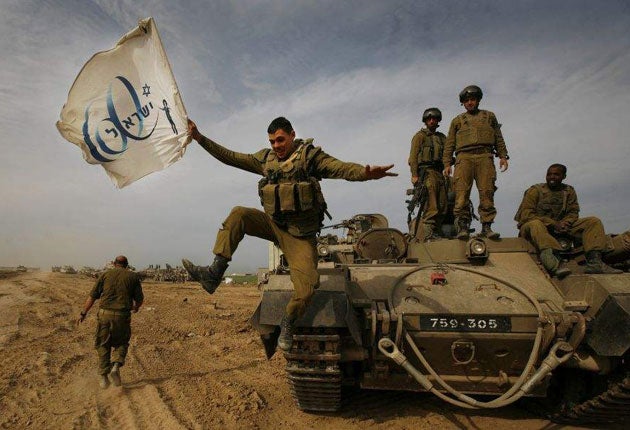Israel mulls unilateral ceasefire as Hamas leader rejects truce
Muslim world in ferment as protests mount in support of Palestinians

The Israeli security cabinet was reported to be considering declaring a unilateral end to its offensive in Gaza as officials talked of the conflict reaching its "final act". Israeli officials said Prime Minister Ehud Olmert would convene a meeting of Israel's security cabinet tonight which could decide to halt the onslaught that has claimed more than 1,100 Palestinian lives.
Earlier, Hamas rejected terms for an Egyptian-brokered ceasefire during a day of intense international diplomatic meetings aimed at ending the bloodshed. The rejection, by the movement's leader, Khaled Maashal, came at a meeting of Arab leaders in Qatar at which the Iranian President, Mahmoud Ahmadinejad, made a surprise appearance.
Israeli officials suggested that Mr Maashal was trying to wring last-minute concessions from the Egyptians, who have put together a framework deal which Cairo hopes it could sign with Israel and the Palestinian Authority by tomorrow to underpin any truce. But Israel may opt to stop the shooting on its own terms, in an effort to rob Hamas of claiming any political gains as a result of the conflict.
Across the Muslim world, angry protests at the bloodshed in Gaza continued, and Israeli soldiers shot dead a Palestinian man during demonstrations in the West Bank after closing off the Palestinian territory to counter calls for a "day of wrath".
The UN secretary general, Ban Ki-moon, in the West Bank to meet Mahmoud Abbas, the President of the Palestinian Authority, said: "It's time to think about a unilateral ceasefire from the Israeli government."
But Mark Regev, the spokesman for Mr Olmert, said: "I don't believe that there's a logical expectation in the international community that Israel would unilaterally cease fire while Hamas would continue to target cities, trying to kill our people."
In an article in The Independent on Wednesday, Ishmail Haniyeh, the Hamas Prime Minister of Gaza who is in hiding in Gaza, said the minimum conditions his organisation could accept were that Israel lift completely and unconditionally its siege of the Gaza Strip, open all border crossings and completely withdraw from Gaza.
But Israeli officials claim splits are appearing among the Hamas leadership, around Mr Maashal, based in Damascus, and those at the receiving end of Israeli pounding in Gaza.
Tzipi Livni, Israel's Foreign Minister, is due back in the country from Washington today with a memorandum of understanding she signed on ways in which the US has promised to assist Israel to stop arms smuggling to Hamas. Condoleezza Rice, the US Secretary of State, after her meeting with Ms Livni, said she could not forecast whether a ceasefire would be achieved before she and George Bush leave office on Tuesday. "We are doing everything we can to bring this to an end," she said.
In Gaza City, 23 bodies were recovered from under rubble, and medics said an 11-year-old girl was killed by shelling. Local people say Israeli rockets struck a mosque during morning prayers. Six rockets were fired into Israel from Gaza but did not cause deaths or injuries.
Hundreds of mourners attended the funeral of a senior Hamas commander, Said Siam, who was killed with his son and brother in an Israeli air strike on Thursday. The Hamas leadership had gone into hiding before the war began and none were at the burial. A statement said: "This new crime committed by the Zionist war machine will not affect the determination of our people or drive us to raise the flag of surrender." More residents of Tel al-Hawa, a densely populated neighbourhood near the centre of Gaza City devastated by shelling on Thursday, took advantage of the partial withdrawal of Israeli tanks to flee their homes, many saying that they had no faith that violence was about to end. Some recalled the exodus of 1948 when thousands of Palestinians fled or were forced out of the newly created state of Israel, with many of them settling in Gaza.
"Our parents had to flee at that time and that is what we are having to do ourselves," said Mohammed Ibrahim Ali, a 44-year-old carpenter. "This is the fate of our people, to be chased from place to place." Abu Mahmous, 54, who has five children, said: "We will never forget this night. We never imagined we'd emerge alive. I am just glad that not more people are dead."
Western diplomats said that conflicting messages were coming from the Arab world, with several rival summits. The summit in Doha was attended by Hamas, Mr Ahmadinejad and the Syrian President, Bashar Assad. Saudi Arabia and Egypt stayed away, preferring to address the issue at a meeting in Kuwait on Monday.
To add to the confusion, Gulf states with strong links to the US held their own summit on the matter on Thursday. "The Arab situation has been very chaotic and this is regrettable," said the Arab League's secretary general, Amr Moussa.
Join our commenting forum
Join thought-provoking conversations, follow other Independent readers and see their replies
Comments
Bookmark popover
Removed from bookmarks